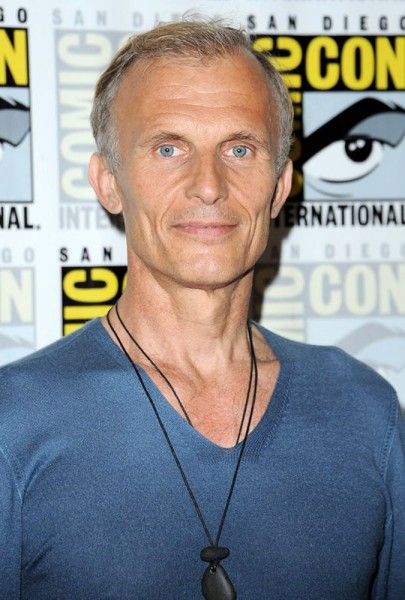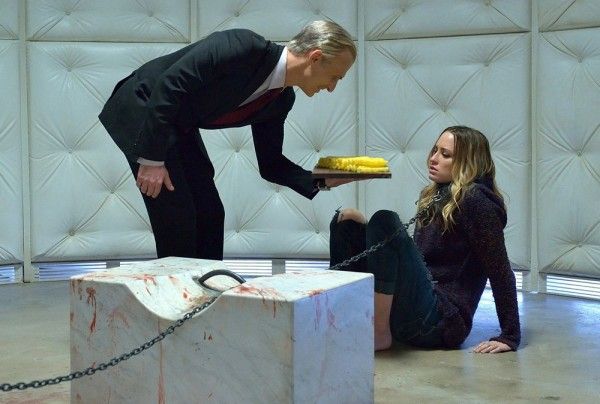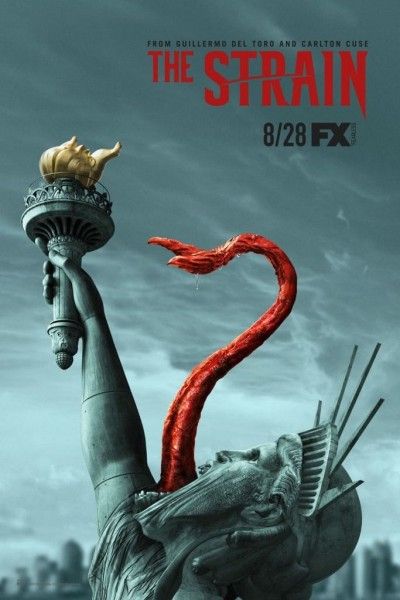On Season 3 of the FX series The Strain, New York City is an all-out battleground, with the people written off by the federal government and fighting for survival on their own. As betrayal, disappointment and paranoia tear people apart, The Master gets one step closer to transforming the human world into one full of strigoi.
During this exclusive interview with Collider, actor Richard Sammel (who plays Eichhorst, The Master’s chief lieutenant) talked about the infection of New York, where things are headed for his character, Eichhorst’s deep crisis, whether his character would ever want to be a leader, the threat of Quinlan, not having to do the long process of make-up every day, and how much he enjoys working in different countries, in a variety of languages. Be aware that there are some spoilers.
Collider: Where are things headed this season, especially when it comes to Eichhorst?
RICHARD SAMMEL: They’re ramping up. It’s getting to a point where I would say something definite should happen. We know that New York is infected. You can go on talking about the world being infected. At a certain point, you have to push the button. Those that have read the books know the whole arc of the storytelling, and we’re in the midst of it. So, I think Season 3 is the turning point of the story. It really shifts from one world to another. When you’ve seen the whole series, you’ll say that there was a before Season 3 and an after Season 3. The conflicts are growing, not only between the two sides, but also inside the camps. The human who decide to fight the evil are not all friends, even if they try. Human relationships are very tricky, as we all know. The alliances between the sides are not as sober and easy-going as one might think, so it becomes tricky. That’s one of the biggest challenges of Season 3.
It seems like both The Master and Eichhorst are realizing that taking over the human race is not as easy as they thought it would be. Will Eichhorst start to question their approach to all of this?
SAMMEL: He goes through a deep identity crisis in Season 3 because things happen that are not supposed to happen for him, according to the plans they had. Specifically for Eichhorst, he’s trained to follow the strong ideology represented by a strong leader. The Nazi ideology that he followed had a strong leader. If the leader delivers, than it’s all good. If the leader doesn’t deliver, than it’s not. That’s the start of Eichhorst’s identity crisis. For Eichhorst, it’s particularly interesting because he’s half-human and half-vampire. On the one hand, he spits on humanity. On the other hand, he still is half-human, meaning that he has the same kind of weaknesses or emotional reactions that humans have. In terms of acting, that’s my biggest interest in playing that character. That’s the weakest point in his mentality, but to play weaknesses is more interesting than playing strengths.
Is Eichhorst still loyal to The Master?
SAMMEL: I would say, in humanity, there is some unbreakable element that makes us so special, and I would call that hope or a belief in something better. It’s something that drives us. And whatever happens or whatever catastrophe we go through, we overcome it because of our belief in that element. Now concerning Eichhorst, I think he has the same thing, which is an incorruptible belief in The Master’s vision of the world. Now that that very thing is getting corrupted, how will Eichhorst deal with it? I won’t spoil it, but that was one of those very interesting things. When you believe too strongly in an ideology, it might be the exact reason why you fail because you become sp sure of your victory that you haven’t seen the small thing that makes you fall. In Season 3, Eichhorst will have big losses and he will have very critical dangers to overcome.
Does Eichhorst see any benefit to becoming a leader himself, or is he not there yet?
SAMMEL: That’s an interesting question. I’m asking myself that very same question. On a certain level of reflection, it’s logical that he would take over The Master’s position. But on another level of reflection, it’s stupid to combine two assets, and then just have one. You should be stronger and not weaker, so if Eichhorst would become The Master, he wouldn’t be able to show up as much as he does. There is no other strong human-faced vampire that can deal with all the humans. That’s exactly what Eichhorst’s role is. But as submitted as he might be, I think he has a dimension where he feels that he can take over the character of The Master. He would do it, if it’s necessary. Would he betray his own kind? Perhaps. I don’t think so, for now, but there is that potential there.
How does Eichhorst feel about someone like Quinlan?
SAMMEL: Quinlan is the exact antithesis of Eichhorst. He is a vampire who is trying to become a human, whereas Eichhorst is the other way around. Eichhorst has more interest in killing Quinlan than Quinlan is with Eichhorst. Quinlan is not focused on Eichhorst. Quinlan is focused on his father’s story. He wants to kill The Master. That’s very destabilizing for Eichhorst. Setrakian, the most powerful human being, in terms of courage and knowledge, and Quinlan, the most powerful vampire, bond in order to kill us. That’s not how it was written. If Eichhorst could get to Quinlan and wipe him out, with any kind of trick or mean operation, he would do it immediately.
We don’t often get to see the monster underneath the human face that Eichhorst shows. When you signed on for this, did you know that you wouldn’t have to be spending much time in make-up?
SAMMEL: Yeah, I knew that, but I didn’t realize that I had escaped the big process of prosthetics, to that extent, until I saw all of my comrades going through three or four hours of make-up. I go through an hour or an hour and a half. And then, every once in awhile, he shows up with his vampire face and I get a special treat. Then, I know what it means to sit in that chair for four or five hours. For me, it’s actually thrilling because I get to know something that I’m not used to. The others do that every working day. It’s a real commitment, not only in terms of acting in front of a camera, but just in order to get there.
You still also work a lot in Europe and do a lot of films overseas. Is it important to you to continue to work in the States and in Europe?
SAMMEL: I’m in a very good place now because I do theater, I do TV and I make movies. I was a dancer, so I dance a little bit. I was a musician, so I do a little bit of music. And I do all of this in four or five different languages, and all over the world. Not so much in Asia, but not only in Europe. If I do a lot of television, than I miss theater. If I do a lot of theater, than I miss film. This global thing of performing arts gives me strength. I can bring in experiences that other actors who only grew up in television do not have. The fact that I speak five languages is just a plus. I do not try to speak every language I know, in every movie. It must make sense. But, the fact that it’s available gives a nice back-up. I’m talking to you in English, but I have a cultural background that’s shaped in England, France and Germany. Bringing that in is nice, in terms of how an actor plays a role or speaks in an interview. It’s a very beneficial experience for me that America has started to be interested in me. I get offers here, and I’m very open to having a new spring in my career here. I’ve always been open. That’s made my resume. I go with what happens, and then I try to make good choices with what I get offered. As for now, I’m very happy where I am, with the comradery with the incredible actors, producers and writers [of The Strain]. I am ready and very excited to work here. There is a potential here. Even though survival here is hard, work is hard and commitment is harder, the potential for where you can go can bring you further. This is the country that is possible. That’s not possible in Europe. If you have a big idea, you can do 10% of it, and then maybe, if it’s a huge success, you might go all-in. Here, you go all-in earlier. You risk more and you get more, so you do more. That’s what I like.
The Strain airs on Sunday nights on FX.






